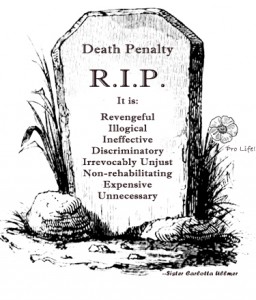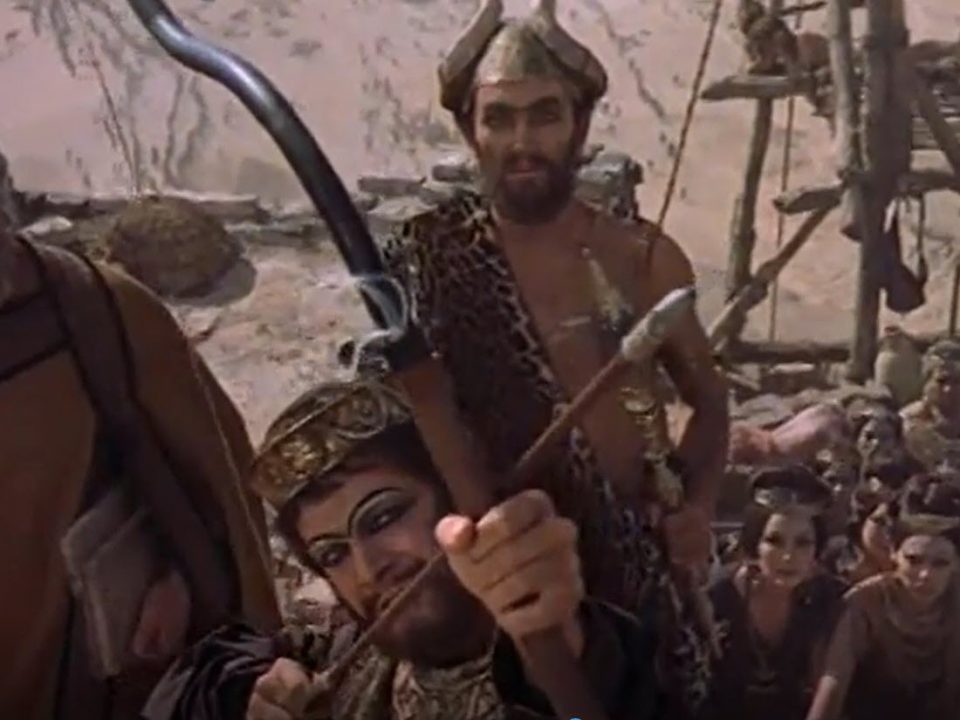Penalty, Punishment & Death
Penalty, Punishment & Death
 Earlier this year a prison inmate confessed to killing a female correctional officer inside the chapel of a prison in the state of Washington. At the time of the killing, the inmate, Byron Scherf, was serving a life sentence as a “three-strikes” offender for prior rape convictions.
Earlier this year a prison inmate confessed to killing a female correctional officer inside the chapel of a prison in the state of Washington. At the time of the killing, the inmate, Byron Scherf, was serving a life sentence as a “three-strikes” offender for prior rape convictions.
In his videotaped confession, Scherf told detectives that he didn’t like the way that Officer Jayme Biendl had talked to him. He said, “I became very angry … and the more that ran through my mind the madder I got. I got to the point where I knew I was going to kill her.” He attacked Biendl from behind and strangled her with a cable that he had removed from an amplifier.
When I initially read about the incident, I thought about the governor of Illinois, Richard Quinn. At that time, Quinn was still “undecided” as to whether he was going to sign legislation banning the death penalty in Illinois. He subsequently signed the legislation after making the following comments to the press:
I have concluded, after looking at all the information that I have received, that it is impossible to create a perfect system – one that is free of all mistakes…. I am deeply concerned by the possibility of an innocent person being executed.
If I had been one of the reporters who was present when Quinn made his comments I would have asked him the following question: “I understand your concerns that there are not adequate safeguards in place to guarantee that an innocent man or woman will not be put to death, but where is your concern for the tens of thousands of unborn children who are killed every year in Illinois as a result of being given the death penalty by their mothers and doctors?”
Like most politicians, Governor Quinn would have most likely avoided answering the question by saying, “While I’m personally opposed to abortion, I don’t think I have the right to impose my personal beliefs on others.” This would be said despite the fact that he imposed his personal beliefs on others by signing legislation that prohibited the imposition of the death penalty, regardless of the circumstances.
Let’s talk about the death penalty for a moment.
The death penalty is usually only available in the most egregious instances in which one person intentionally kills another person. The Catholic Church’s position on the death penalty is that a legitimate government has the right to take the life of certain criminals; however, most of the leaders of the Catholic Church believe that the death penalty should rarely (if ever) be used. Why? Because the Church goes out of its way to teach and promote respect for human life, and the execution of even the most vicious criminal cheapens human life.
What are some of the reasons we hear to justify the death penalty? One reason that is given is that it is an appropriate punishment for certain types of crimes. But is the death penalty really a “punishment”? The answer to that question is, no it’s not a punishment. It’s not a penalty either. How can you punish or impose a penalty on a dead man? Other than the fear that may lead up to the execution itself, there is no punishment. The “punishment” ends when the criminal dies. What punishment would be worse – death, or spending the remainder of a lifetime in prison while being denied access to family, friends, and the outside world? The only people who are ordinarily punished when a criminal is executed are his mother and his other family members.
What about the deterrence argument? I have not seen any convincing evidence that the death penalty deters other criminals from committing crimes. I suppose if we periodically hung criminals from nooses near grade schools and high schools where young boys and girls could see their dead bodies dangling for several days, there would be some deterrence. But that’s not how we execute our criminals. They are taken to a room where there is a doctor and some prison personnel and they are given an injection that first puts them to sleep and then causes their hearts to stop beating. A painless death that is hidden from the public.
The young gang member who is filled with anger and hate isn’t thinking about the death penalty when he commits a crime. He may be thinking about proving his manhood to his peers. Or he may be thinking about getting revenge against a rival gang member. Or he may be thinking about how he is going to retaliate against someone who “deserves” to be punished. Or he may be thinking about how he needs money so he walks into a gas station and points his gun at the cashier. In the gang member’s way of thinking, if someone ends up getting killed, that’s the way it is. The furthest thing from his mind is that he might get caught, convicted, and then sentenced to die. The existence of the death penalty will not deter him or any other hate-filled criminal from committing a crime.
The most despicable and disgusting of all of the arguments is that it costs too much money to feed and maintain a ruthless killer. This is the worst argument of all because it presumes that while the life of one person may have great value, a monetary price can be placed upon the life of a wretched criminal. As Catholics, we are taught to value all human life and no amount of money can ever be exchanged for that life.
Let’s be honest about the real reason most people favor the death penalty. It can be summarized in one word: vengeance. Vengeance is the infliction of punishment or pain upon someone in retaliation for an injury or offense. Vengeance is about getting even. It’s about killing a person to avenge the killing of another person.
So should we ever have a right to kill another person? The answer is yes. It’s a right that has been recognized in every civil society since the beginning of time. I’m talking about the right of self-defense. If I’m attacked by someone on the street and I believe (within reason) that I am in danger of being killed, I have the right to use deadly force against the attacker. If I witness a person attacking another person and I reasonably believe that the other person’s life is in danger, I have the right to use deadly force against the attacker to save the other person. If our country is attacked by another country, we have a right to defend ourselves by killing our attackers.
In my opinion, the only time the death penalty is justified is when it is used in self-defense. When Byron Scherf strangled the female guard inside the chapel of the prison, he knew he had nothing to lose. What could the justice system do to him? Give him another life sentence? He was already of “lifer.” What’s going to stop him from killing another prison employee or a fellow prisoner? Nothing will stop him. He must be put to death so that the innocent people around him can survive. Every human being has a right to survival and self-defense. It is the obligation of government to defend its citizens against an attacker.
What I have done here today – defend all human life – is easier said than done. I’m sure that if one of my family members was brutally tortured and killed, I would want revenge. I would want the killer’s life to be extended so that he could be repeatedly tortured – day after day, week after week, month after month. Death would be too easy for him. I would have to fight off the hardening my heart against the killer’s mother and family members. What about my pain and the pain of my family members. I hope and pray that I am never in that situation – a situation in which I will have to choose between revenge and my Catholic beliefs.
This week we are going to (figuratively) relive the torture and crucifixion of our Savior. He could have called upon His legions of angels to come down and save Him from the death penalty that was imposed upon Him. Instead, He forgave them and asked His Father to forgive them. His mother, the Blessed Virgin Mary, did the same. It is Him and His mother that we, as Catholics, are called to imitate. For the normal human being, it is an impossible task. For the devout Catholic, it is not only possible, but expected. You and I have it in us to be like Jesus and Mary. This week will provide us with the opportunity to again resolve to imitate Jesus and Mary in everything that we do – especially in the way we forgive others for the offenses they have committed against us.



